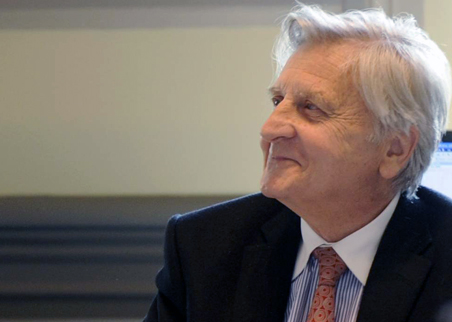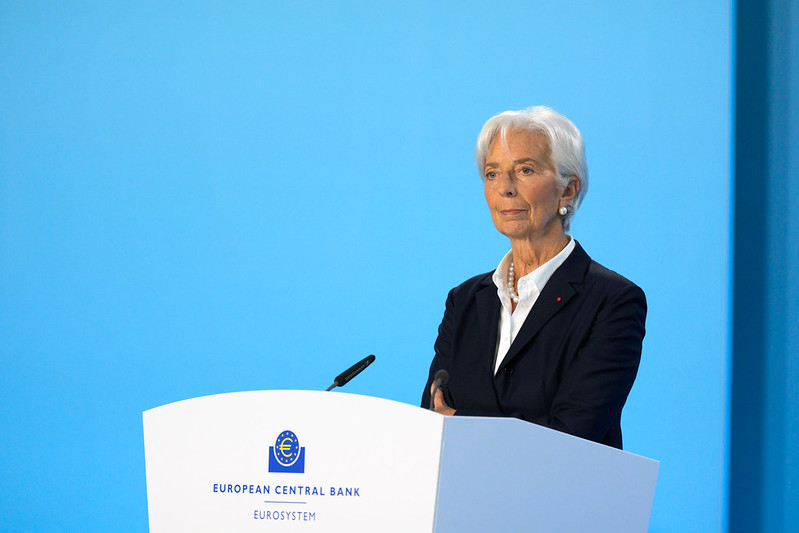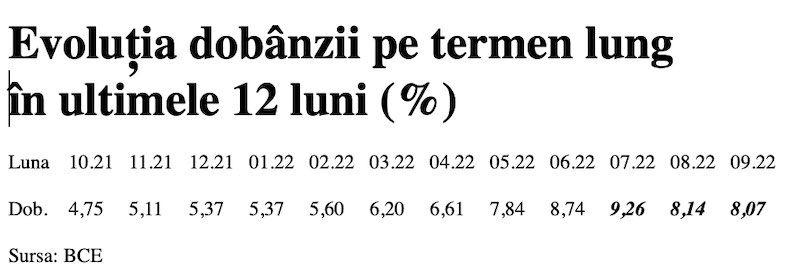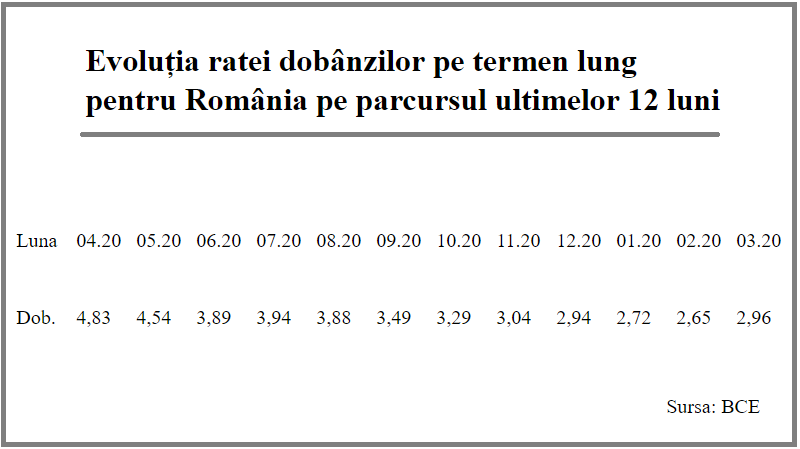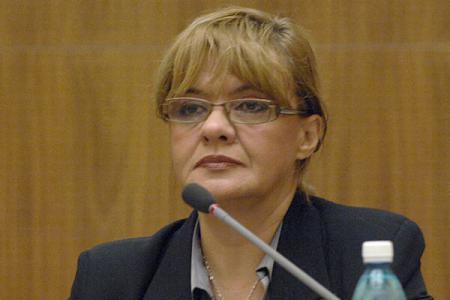Jean-Claude Trichet: Interview with Corriere della Sera
 Autor: Bancherul.ro
Autor: Bancherul.ro
2011-09-28 14:54
Interview with Jean-Claude Trichet, President of the European Central Bank, conducted by Marika De Feo, Corriere della Sera
1. Mr President, are you satisfied with the outcome of the meetings in Washington?
It is always extremely important for world leaders in the areas of economy and finance to exchange views, compare notes and work out a diagnosis of the situation which is lucid and without any complacency. We are in the fourth year of a very demanding global crisis. The epicentre of the crisis is in Europe, but it is a global crisis. On behalf of the ECB’s Governing Council, I called on all European authorities to be up to the very demanding challenges of the times and to demonstrate their sense of direction. And I told our partners in the rest of the world that we needed support and strong encouragement for European affairs, but not public lectures.
2. The G20 pledged on Thursday to “take all necessary actions to preserve the stability of banking systems and financial markets”. Which strong and collective action do you suggest?
First, the full, comprehensive and speedy implementation of all decisions already taken individually and collectively in Europe and in the world. As regards the Europeans, full and swift implementation of the decisions taken on 21 July.
Second, as has been underlined by the European Systemic Risk Board, coordinated efforts to strengthen bank capital, including recourse to backstop facilities.
Third, we need to stand ready to respond to new challenges that can arise at any time. Permanent and credible alertness is more important than ever in the present circumstances.
3. Are governments responsible for the dangerous development of the crisis?
I am on record as having stressed, on behalf of the Governing Council, since the inception of the euro, that fiscal soundness was of the essence, that the Stability and Growth Pact was fundamental in a single currency area without a federal budget, and that the surveillance of competitive indicators by peers was absolutely necessary. All this is clearly documented.
Now, in the present very demanding circumstances, what counts is that all authorities are up to their responsibilities. Now is the time for effective action, implementation, verbal discipline and a stronger team spirit on the part of the European executive branches.
4. European countries were urged to boost the rescue fund (EFSF) to contain contagion and avoid recession. What do you think of that? Could the EFSF be leveraged, for example, through the European Central Bank, or receive a bank licence? Or is it better to anticipate the creation of the ESM, as Germans suggest?
I call for the full and swift implementation of the decisions of 21 July taken by the 17 Heads of State or Government. And for them to stand ready to face up to acute new challenges in a period which is so demanding.
5. Mr President, growth seems to have deteriorated quickly, downside risks to growth are augmenting. Are these reasons strong enough for the ECB to become more aggressive in the fight against the crisis, involving also monetary policy?
As you know, we consider that being a very solid anchor of stability and confidence in the turbulent times we are experiencing is a fundamental contribution to growth and job creation. The remarkable anchoring of inflation expectations, which is due to our credible monetary policy, protects us against the risk of inflation and the risk of deflation. You know our well-established concept: we are never pre-committed, and our interest rates are always designed to deliver price stability in line with our definition and the anchoring of expectations.
6. Would the ECB go as far as introducing also other liquidity operations, for example 12-month liquidity operations, as was suggested in Washington?
Do not forget that we are presently refinancing all our banks on the basis of full allotment at a fixed rate at one-week, one-month and three-month maturities. This is the most important of our non-standard measures, designed to help restore a better monetary policy transmission mechanism. These non-standard measures have to be exactly commensurate to the degree of abnormal functioning of markets in the assessment of the Governing Council.
7. Do you think that the downgrading of Italy recently decided by Standard & Poor’s is justified?
I do not comment on decisions by rating agencies. Investors and savers know that what counts is their own judgement. What counts are fundamentals and actions taken by governments and parliaments to enhance and consolidate confidence.
8. And are you satisfied with these actions until now?
As you know, we sent messages to Italy that were followed by action and, after some hesitation, the decisions were confirmed rapidly by the parliament. Of course, this is work in progress, all this has to be implemented as soon as possible, and there are other measures upon which the authorities are reflecting.
9. Which measures are still missing?
We would encourage everything that goes in the direction of structural reforms to unleash the capacity of Italy to grow faster, to have a better growth potential. The potential of Italy is immense, and the present growth potential is not in line with the overall capacity of Italy. I think there is a general consensus among economists on this, and everything that goes in the direction of unleashing productive forces is welcome.
10. Which other strengths do you see in the potential of the Italian economy?
One of the major strengths of Italy is its entrepreneurial spirit. The capacity of individuals and families to start a business, take risks and be devoted to their enterprises is exceptional. But this entrepreneurial spirit, which is shared by society as a whole, needs to be allowed to develop fully through structural reforms aimed at increasing the flexibility of the economy.
11. What more should be done to increase growth? For instance, reducing protection in non-tradable sectors and monopolies, approving the liberalisation of closed professions, higher pension age, making labour markets more flexible and an overall increase in productivity?
A lot of things can be done, in particular but not exclusively the liberalisation of closed professions, improved flexibility of the labour markets, improved education and training, and measures to boost innovation.
12. How do you evaluate the fact that Italy is going to have a primary surplus as a percentage of GDP from next year onwards?
It is of course something which is important, and maybe not sufficiently well-known by external observers. We encourage Italy to follow this path and to do all that is necessary in order to consolidate this primary surplus and reach the goal of having balanced overall public finances in 2013.
13. Do you think that this objective can be reached with the measures taken until now?
What counts is the goal. The decisions which were taken recently make it possible to advance significantly in the direction of that goal. Whether new decisions will have to be taken, taking into account the overall situation and the evolution of the real economy, is an open question. But the goal is the goal; it has been affirmed, and it is very important.
14. Would it have been better to publish the messages you sent to Italy?
As you know, we have sent messages and we do that on a permanent basis, through various means, addressed to individual governments. We do not make them public. But we are calling for all governments without exception to permanently ensure sound fiscal and macroeconomic policies. We do this every month in the Eurogroup and in ECOFIN, so this is not something extraordinary.
15. The SMP is temporary, how long will you go on with the programme?
We are implementing this programme – like all non-standard measures – for monetary policy reasons, to restore a better transmission of our monetary policy, because some markets or segments are disrupted and not functioning properly. These disruptions, in the case of the Securities Markets Programme (SMP), are due to the fact that governments, individually, still have to ensure their full credibility in the markets, and that the peer surveillance called for by the Stability and Growth Pact was not exercised correctly. It was on the basis of the commitments of 21 July made by the EU Heads of State or Government that the Governing Council of the ECB decided to activate the SMP, taking into account the commitment of governments to give the EFSF the capacity to intervene on the secondary market.
16. Are you buying sovereign bonds to help Italy in particular?
No. We are embarking on the SMP to help restore a better transmission mechanism for monetary policy at a time when governments have not yet implemented their decision of 21 July.
17. What will happen when you stop this programme?
I already explained how we see this programme and the commitment of the governments to step in individually and collectively.
18. Many are calling for Greece to default, also from the Governing Council…
We have decisions which were taken with the signature of 17 Heads of State or Government on 21 July, and the Governing Council considers that it is extremely important that all the decisions be implemented. Moreover, the key to everything are the decisions of the Greek government, which has to adjust in a decisive way, in the interests of the Greek people.
19. But some observers from outside have the impression that you are also losing patience with Greece.
Our message is crystal clear.
20. Are you satisfied with this first agreement of the Troika?
When we have a report, we shall see.
21. Will the role of the EFSF be enough to substitute for the ECB?
The decisions which have been taken by the European governments have to be fully implemented, and they explicitly include the possibility of intervening on the secondary bond market.
22. People say that we are at a crossroads for Monetary Union, where the euro may break apart, remain only 10-12 countries, or have a more integrated governance.
Since 9 August 2007 we have been experiencing the worst crisis since the Second World War. This global crisis is challenging the strategies of all the big advanced economies, Japan, the United States and Europe. So it is not surprising that we are all in very demanding times. As regards Europe, it is absolutely crucial to make a distinction between the currency itself and the tensions that we have observed in some countries. The euro has kept its value remarkably over 13 years, has preserved price stability, is backed by strong fundamentals and is considered by markets to be solid and stable for the next ten years, when we look at inflation expectations. On a consolidated basis, public finances in the euro area are sounder than in the United States or in Japan, with a public finance deficit of 4.5% of GDP, whereas it is around 10% in the other two countries. That being said, we have a number of countries that undoubtedly have to correct their policies. And that calls for a strong enforcement of their national policies in the domain of public finances and structural reforms. We must have a “quantum leap” in the governance of the 17 members of the euro area.
23. Mr President, did the role of the ECB change during the crisis, and if so, how?
The ECB is an anchor of stability and confidence in Europe. Its track record in terms of price stability is remarkable and better than what any of the euro area countries experienced over the last 50 years. The crisis did not change anything in this respect. On the contrary, in times of difficulty, turbulence and crisis, the role of the ECB as an anchor is even more important.
24. Is there still a vision for a united Europe?
I profoundly believe that the people of Europe feel that, in the present world, a united Europe is more important than ever. The rise of the big emerging economies, the structural changes at the global level, and the rapid advances of science and technology call for Europeans to unite, with a profoundly improved governance structure.
25. How many hours do you work every day, how many days a week? Do you still have room for private interests and family?
I would say 10 to 11 hours a day and probably, as an average, 6 to 6½ days a week, depending on the European and international working weekends. It is demanding, particularly in times of turbulence. I thank profoundly my wife and family for their understanding.
European Central Bank
Directorate Communications
Press and Information Division
Comentarii
Adauga un comentariu
Adauga un comentariu folosind contul de Facebook
Alte stiri din categoria: Noutati BCE
Banca Centrala Europeana (BCE) explica de ce a majorat dobanda la 2%
Banca Centrala Europeana (BCE) explica de ce a majorat dobanda la 2%, in cadrul unei conferinte de presa sustinute de Christine Lagarde, președinta BCE, si Luis de Guindos, vicepreședintele BCE. Iata textul publicat de BCE: DECLARAȚIE DE POLITICĂ MONETARĂ detalii
BCE creste dobanda la 2%, dupa ce inflatia a ajuns la 10%
Banca Centrala Europeana (BCE) a majorat dobanda de referinta pentru tarile din zona euro cu 0,75 puncte, la 2% pe an, din cauza cresterii substantiale a inflatiei, ajunsa la aproape 10% in septembrie, cu mult peste tinta BCE, de doar 2%. In aceste conditii, BCE a anuntat ca va continua sa majoreze dobanda de politica monetara. De asemenea, BCE a luat masuri pentru a reduce nivelul imprumuturilor acordate bancilor in perioada pandemiei coronavirusului, prin majorarea dobanzii aferente acestor facilitati, denumite operațiuni țintite de refinanțare pe termen mai lung (OTRTL). Comunicatul BCE Consiliul guvernatorilor a decis astăzi să majoreze cu 75 puncte de bază cele trei rate ale dobânzilor detalii
Dobânda pe termen lung a continuat să scadă in septembrie 2022. Ecartul față de Polonia și Cehia, redus semnificativ
Dobânda pe termen lung pentru România a scăzut în septembrie 2022 la valoarea medie de 8,07%, potrivit datelor publicate de Banca Centrală Europeană. Acest indicator, cu referința la un termen de 10 ani (10Y), a continuat astfel tendința detalii
Rata dobanzii pe termen lung pentru Romania, in crestere la 2,96%
Rata dobânzii pe termen lung pentru România a crescut la 2,96% în luna martie 2021, de la 2,65% în luna precedentă, potrivit datelor publicate de Banca Centrală Europeană. Acest indicator critic pentru plățile la datoria externă scăzuse anterior timp de șapte luni detalii
- BCE recomanda bancilor sa nu plateasca dividende
- Modul de functionare a relaxarii cantitative (quantitative easing – QE)
- Dobanda la euro nu va creste pana in iunie 2020
- BCE trebuie sa fie consultata inainte de adoptarea de legi care afecteaza bancile nationale
- BCE a publicat avizul privind taxa bancara
- BCE va mentine la 0% dobanda de referinta pentru euro cel putin pana la finalul lui 2019
- ECB: Insights into the digital transformation of the retail payments ecosystem
- ECB introductory statement on Governing Council decisions
- Speech by Mario Draghi, President of the ECB: Sustaining openness in a dynamic global economy
- Deciziile de politica monetara ale BCE
Criza COVID-19
- In majoritatea unitatilor BRD se poate intra fara certificat verde
- La BCR se poate intra fara certificat verde
- Firmele, obligate sa dea zile libere parintilor care stau cu copiii in timpul pandemiei de coronavirus
- CEC Bank: accesul in banca se face fara certificat verde
- Cum se amana ratele la creditele Garanti BBVA
Topuri Banci
- Topul bancilor dupa active si cota de piata in perioada 2022-2015
- Topul bancilor cu cele mai mici dobanzi la creditele de nevoi personale
- Topul bancilor la active in 2019
- Topul celor mai mari banci din Romania dupa valoarea activelor in 2018
- Topul bancilor dupa active in 2017
Asociatia Romana a Bancilor (ARB)
- Băncile din România nu au majorat comisioanele aferente operațiunilor în numerar
- Concurs de educatie financiara pentru elevi, cu premii in bani
- Creditele acordate de banci au crescut cu 14% in 2022
- Romanii stiu educatie financiara de nota 7
- Gradul de incluziune financiara in Romania a ajuns la aproape 70%
ROBOR
- ROBOR: ce este, cum se calculeaza, ce il influenteaza, explicat de Asociatia Pietelor Financiare
- ROBOR a scazut la 1,59%, dupa ce BNR a redus dobanda la 1,25%
- Dobanzile variabile la creditele noi in lei nu scad, pentru ca IRCC ramane aproape neschimbat, la 2,4%, desi ROBOR s-a micsorat cu un punct, la 2,2%
- IRCC, indicele de dobanda pentru creditele in lei ale persoanelor fizice, a scazut la 1,75%, dar nu va avea efecte imediate pe piata creditarii
- Istoricul ROBOR la 3 luni, in perioada 01.08.1995 - 31.12.2019
Taxa bancara
- Normele metodologice pentru aplicarea taxei bancare, publicate de Ministerul Finantelor
- Noul ROBOR se va aplica automat la creditele noi si prin refinantare la cele in derulare
- Taxa bancara ar putea fi redusa de la 1,2% la 0,4% la bancile mari si 0,2% la cele mici, insa bancherii avertizeaza ca indiferent de nivelul acesteia, intermedierea financiara va scadea iar dobanzile vor creste
- Raiffeisen anunta ca activitatea bancii a incetinit substantial din cauza taxei bancare; strategia va fi reevaluata, nu vor mai fi acordate credite cu dobanzi mici
- Tariceanu anunta un acord de principiu privind taxa bancara: ROBOR-ul ar putea fi inlocuit cu marja de dobanda a bancilor
Statistici BNR
- Deficitul contului curent, aproape 20 miliarde euro după primele nouă luni
- Deficitul contului curent, aproape 18 miliarde euro după primele opt luni
- Deficitul contului curent, peste 9 miliarde euro pe primele cinci luni
- Deficitul contului curent, 6,6 miliarde euro după prima treime a anului
- Deficitul contului curent pe T1, aproape 4 miliarde euro
Legislatie
- Legea nr. 311/2015 privind schemele de garantare a depozitelor şi Fondul de garantare a depozitelor bancare
- Rambursarea anticipata a unui credit, conform OUG 50/2010
- OUG nr.21 din 1992 privind protectia consumatorului, actualizata
- Legea nr. 190 din 1999 privind creditul ipotecar pentru investiții imobiliare
- Reguli privind stabilirea ratelor de referinţă ROBID şi ROBOR
Lege plafonare dobanzi credite
- BNR propune Parlamentului plafonarea dobanzilor la creditele bancilor intre 1,5 si 4 ori peste DAE medie, in functie de tipul creditului; in cazul IFN-urilor, plafonarea dobanzilor nu se justifica
- Legile privind plafonarea dobanzilor la credite si a datoriilor preluate de firmele de recuperare se discuta in Parlament (actualizat)
- Legea privind plafonarea dobanzilor la credite nu a fost inclusa pe ordinea de zi a comisiilor din Camera Deputatilor
- Senatorul Zamfir, despre plafonarea dobanzilor la credite: numai bou-i consecvent!
- Parlamentul dezbate marti legile de plafonare a dobanzilor la credite si a datoriilor cesionate de banci firmelor de recuperare (actualizat)
Anunturi banci
- Cate reclamatii primeste Intesa Sanpaolo Bank si cum le gestioneaza
- Platile instant, posibile la 13 banci
- Aplicatia CEC app va functiona doar pe telefoane cu Android minim 8 sau iOS minim 12
- Bancile comunica automat cu ANAF situatia popririlor
- BRD bate recordul la credite de consum, in ciuda dobanzilor mari, si obtine un profit ridicat
Analize economice
- Inflația anuală a crescut marginal
- Comerțul cu amănuntul - în creștere cu 7,7% cumulat pe primele 9 luni
- România, pe locul 16 din 27 de state membre ca pondere a datoriei publice în PIB
- România, tot prima în UE la inflația anuală, dar decalajul s-a redus
- Exporturile lunare în august, la cel mai redus nivel din ultimul an
Ministerul Finantelor
- Datoria publică, 51,4% din PIB la mijlocul anului
- Deficit bugetar de 3,6% din PIB după prima jumătate a anului
- Deficit bugetar de 3,4% din PIB după primele cinci luni ale anului
- Deficit bugetar îngrijorător după prima treime a anului
- Deficitul bugetar, -2,06% din PIB pe primul trimestru al anului
Biroul de Credit
- FUNDAMENTAREA LEGALITATII PRELUCRARII DATELOR PERSONALE IN SISTEMUL BIROULUI DE CREDIT
- BCR: prelucrarea datelor personale la Biroul de Credit
- Care banci si IFN-uri raporteaza clientii la Biroul de Credit
- Ce trebuie sa stim despre Biroul de Credit
- Care este procedura BCR de raportare a clientilor la Biroul de Credit
Procese
- ANPC pierde un proces cu Intesa si ARB privind modul de calcul al ratelor la credite
- Un client Credius obtine in justitie anularea creditului, din cauza dobanzii prea mari
- Hotararea judecatoriei prin care Aedificium, fosta Raiffeisen Banca pentru Locuinte, si statul sunt obligati sa achite unui client prima de stat
- Decizia Curtii de Apel Bucuresti in procesul dintre Raiffeisen Banca pentru Locuinte si Curtea de Conturi
- Vodafone, obligata de judecatori sa despagubeasca un abonat caruia a refuzat sa-i repare un telefon stricat sau sa-i dea banii inapoi (decizia instantei)
Stiri economice
- Datoria publică, 52,7% din PIB la finele lunii august 2024
- -5,44% din PIB, deficit bugetar înaintea ultimului trimestru din 2024
- Prețurile industriale - scădere în august dar indicele anual a continuat să crească
- România, pe locul 4 în UE la scăderea prețurilor agricole
- Industria prelucrătoare, evoluție neconvingătoare pe luna iulie 2024
Statistici
- România, pe locul trei în UE la creșterea costului muncii în T2 2024
- Cheltuielile cu pensiile - România, pe locul 19 în UE ca pondere în PIB
- Dobanda din Cehia a crescut cu 7 puncte intr-un singur an
- Care este valoarea salariului minim brut si net pe economie in 2024?
- Cat va fi salariul brut si net in Romania in 2024, 2025, 2026 si 2027, conform prognozei oficiale
FNGCIMM
- Programul IMM Invest continua si in 2021
- Garantiile de stat pentru credite acordate de FNGCIMM au crescut cu 185% in 2020
- Programul IMM invest se prelungeste pana in 30 iunie 2021
- Firmele pot obtine credite bancare garantate si subventionate de stat, pe baza facturilor (factoring), prin programul IMM Factor
- Programul IMM Leasing va fi operational in perioada urmatoare, anunta FNGCIMM
Calculator de credite
- ROBOR la 3 luni a scazut cu aproape un punct, dupa masurile luate de BNR; cu cat se reduce rata la credite?
- In ce mall din sectorul 4 pot face o simulare pentru o refinantare?
Noutati BCE
- Acord intre BCE si BNR pentru supravegherea bancilor
- Banca Centrala Europeana (BCE) explica de ce a majorat dobanda la 2%
- BCE creste dobanda la 2%, dupa ce inflatia a ajuns la 10%
- Dobânda pe termen lung a continuat să scadă in septembrie 2022. Ecartul față de Polonia și Cehia, redus semnificativ
- Rata dobanzii pe termen lung pentru Romania, in crestere la 2,96%
Noutati EBA
- Bancile romanesti detin cele mai multe titluri de stat din Europa
- Guidelines on legislative and non-legislative moratoria on loan repayments applied in the light of the COVID-19 crisis
- The EBA reactivates its Guidelines on legislative and non-legislative moratoria
- EBA publishes 2018 EU-wide stress test results
- EBA launches 2018 EU-wide transparency exercise
Noutati FGDB
- Banii din banci sunt garantati, anunta FGDB
- Depozitele bancare garantate de FGDB au crescut cu 13 miliarde lei
- Depozitele bancare garantate de FGDB reprezinta doua treimi din totalul depozitelor din bancile romanesti
- Peste 80% din depozitele bancare sunt garantate
- Depozitele bancare nu intra in campania electorala
CSALB
- La CSALB poti castiga un litigiu cu banca pe care l-ai pierde in instanta
- Negocierile dintre banci si clienti la CSALB, in crestere cu 30%
- Sondaj: dobanda fixa la credite, considerata mai buna decat cea variabila, desi este mai mare
- CSALB: Romanii cu credite caută soluții pentru reducerea ratelor. Cum raspund bancile
- O firma care a facut un schimb valutar gresit s-a inteles cu banca, prin intermediul CSALB
First Bank
- Ce trebuie sa faca cei care au asigurare la credit emisa de Euroins
- First Bank este reprezentanta Eurobank in Romania: ce se intampla cu creditele Bancpost?
- Clientii First Bank pot face plati prin Google Pay
- First Bank anunta rezultatele financiare din prima jumatate a anului 2021
- First Bank are o noua aplicatie de mobile banking
Noutati FMI
- FMI: criza COVID-19 se transforma in criza economica si financiara in 2020, suntem pregatiti cu 1 trilion (o mie de miliarde) de dolari, pentru a ajuta tarile in dificultate; prioritatea sunt ajutoarele financiare pentru familiile si firmele vulnerabile
- FMI cere BNR sa intareasca politica monetara iar Guvernului sa modifice legea pensiilor
- FMI: majorarea salariilor din sectorul public si legea pensiilor ar trebui reevaluate
- IMF statement of the 2018 Article IV Mission to Romania
- Jaewoo Lee, new IMF mission chief for Romania and Bulgaria
Noutati BERD
- Creditele neperformante (npl) - statistici BERD
- BERD este ingrijorata de investigatia autoritatilor din Republica Moldova la Victoria Bank, subsidiara Bancii Transilvania
- BERD dezvaluie cat a platit pe actiunile Piraeus Bank
- ING Bank si BERD finanteaza parcul logistic CTPark Bucharest
- EBRD hails Moldova banking breakthrough
Noutati Federal Reserve
- Federal Reserve anunta noi masuri extinse pentru combaterea crizei COVID-19, care produce pagube "imense" in Statele Unite si in lume
- Federal Reserve urca dobanda la 2,25%
- Federal Reserve decided to maintain the target range for the federal funds rate at 1-1/2 to 1-3/4 percent
- Federal Reserve majoreaza dobanda de referinta pentru dolar la 1,5% - 1,75%
- Federal Reserve issues FOMC statement
Noutati BEI
- BEI a redus cu 31% sprijinul acordat Romaniei in 2018
- Romania implements SME Initiative: EUR 580 m for Romanian businesses
- European Investment Bank (EIB) is lending EUR 20 million to Agricover Credit IFN
Mobile banking
- Comisioanele BRD pentru MyBRD Mobile, MyBRD Net, My BRD SMS
- Termeni si conditii contractuale ale serviciului You BRD
- Recomandari de securitate ale BRD pentru utilizatorii de internet/mobile banking
- CEC Bank - Ghid utilizare token sub forma de card bancar
- Cinci banci permit platile cu telefonul mobil prin Google Pay
Noutati Comisia Europeana
- Avertismentul Comitetului European pentru risc sistemic (CERS) privind vulnerabilitățile din sistemul financiar al Uniunii
- Cele mai mici preturi din Europa sunt in Romania
- State aid: Commission refers Romania to Court for failure to recover illegal aid worth up to €92 million
- Comisia Europeana publica raportul privind progresele inregistrate de Romania in cadrul mecanismului de cooperare si de verificare (MCV)
- Infringements: Commission refers Greece, Ireland and Romania to the Court of Justice for not implementing anti-money laundering rules
Noutati BVB
- BET AeRO, primul indice pentru piata AeRO, la BVB
- Laptaria cu Caimac s-a listat pe piata AeRO a BVB
- Banca Transilvania plateste un dividend brut pe actiune de 0,17 lei din profitul pe 2018
- Obligatiunile Bancii Transilvania se tranzactioneaza la Bursa de Valori Bucuresti
- Obligatiunile Good Pople SA (FRU21) au debutat pe piata AeRO
Institutul National de Statistica
- Deficitul balanței comerciale la 9 luni, cu 15% mai mare față de aceeași perioadă a anului trecut
- Producția industrială, în scădere semnificativă
- Pensia reală, în creștere cu 8,7% pe luna august 2024
- Avansul PIB pe T1 2024, majorat la +0,5%
- Industria prelucrătoare a trecut pe plus în aprilie 2024
Informatii utile asigurari
- Data de la care FGA face plati pentru asigurarile RCA Euroins: 17 mai 2023
- Asigurarea împotriva dezastrelor, valabilă și in caz de faliment
- Asiguratii nu au nevoie de documente de confirmare a cutremurului
- Cum functioneaza o asigurare de viata Metropolitan pentru un credit la Banca Transilvania?
- Care sunt documente necesare pentru dosarul de dauna la Cardif?
ING Bank
- La ING se vor putea face plati instant din decembrie 2022
- Cum evitam tentativele de frauda online?
- Clientii ING Bank trebuie sa-si actualizeze aplicatia Home Bank pana in 20 martie
- Obligatiunile Rockcastle, cel mai mare proprietar de centre comerciale din Europa Centrala si de Est, intermediata de ING Bank
- ING Bank transforma departamentul de responsabilitate sociala intr-unul de sustenabilitate
Ultimele Comentarii
-
LOAN OFFER
Buna ziua Aceasta pentru a informa publicul larg că oferim împrumuturi celor care au nevoie de ... detalii
-
!
Greu cu limba romana! Ce legatura are cuvantul "ecosistem" din limba romana cu sistemul de plati ... detalii
-
Bancnote vechi
Am 2 bancnote vechi:1-1000000lei;2-5000000lei Anul ... detalii
-
Bancnote vechi
Numar de ... detalii
-
Bancnote vechi
Am 3 bancnote vechi:1-1000000lei;1-5000lei;1-100000;mai multe bancnote cu eclipsa de ... detalii



